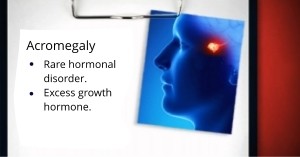Acromegaly Newport Beach & Orange County, CA
Acromegaly Treatment in Orange County
 Acromegaly is a rare hormonal disorder that often develops when your pituitary gland produces excess growth hormone during adulthood. The scientific term acromegaly literally means enlarged extremities. Acromegaly usually affects middle-aged adults.
Acromegaly is a rare hormonal disorder that often develops when your pituitary gland produces excess growth hormone during adulthood. The scientific term acromegaly literally means enlarged extremities. Acromegaly usually affects middle-aged adults.
If the pituitary gland GH secretion becomes independent of the normal regulatory mechanisms, IGF-1 is maintained at high levels, leading to abnormal bone growth and organ enlargement. The excess GH promotes insulin resistance, leads to changes in sugar and lipid metabolism, and can cause diabetes
Acromegaly is associated with various symptoms due to the excess of hormones in the body, which may include:
- Abnormal enlargement of the hands and feet
- Changes in facial features (enlarged nose, lips, tongue, etc.)
- Widened fingers or toes, with swelling, redness, and pain
- Widely spaced teeth
- Joint pain, limited joint movement, swelling of the bony areas around a joint
- Dizziness
- Deepening of the voice in males
- Oily skin and excessive sweating
- Increased number of skin tags
- Carpal tunnel syndrome
- Arthritis
- Headache
- Sleep apnea
- High blood pressure
- Diabetes
- Loss of visual acuity
- Heart diseases due to heart enlargement
To diagnose pituitary adenoma, Robert Louis, MD, who has experience and training in diagnosing acromegaly, will conduct thorough medical history, and physical tests for the existence of acromegaly in patients. Standard diagnostic tests include:
- Hormone testing
- Oral glucose tolerance test
- Magnetic resonance imaging
Hormone testing: Dr. Louis will order blood tests to specifically look for an elevated level of IGF-1. In premenopausal women, the GH levels can be high even though the IGF-1 levels are normal,an estrogen-resistant phenomenon.
Oral glucose tolerance test (OGTT): You may be asked to undergo an oral glucose tolerance test (OGTT) to confirm the diagnosis. Drinking 75 grams of a glucose solution should lower the GH level to lower than one nanogram per milliliter. In acromegalics, this suppression does not occur and may in fact increase.
Magnetic resonance imaging (MRI): This is the preferred way to detect acromegaly, using a special MRI pituitary protocol to properly visualize the pituitary tumor.
Acromegaly treatment will depend on multiple factors, including the size and location of the tumor, age, and overall health condition of the patient. Treatment options include:
Minimally Invasive Endoscopic Transsphenoidal Surgery
Orange County neurosurgeon Robert Louis, MD, specializes in minimally invasive endoscopic transsphenoidal surgery for the removal of acromegaly. This sophisticated procedure removes the tumor while minimizing complications, hospital time, trauma, and discomfort. Dr. Louis has specialized skills and training with this advanced technique. Read more about Endoscopic Transsphenoidal Surgery.
Medications
Sometimes use of medication, and not surgery may be the best initial course of treatment. However, in most cases, patients require a combination of medical and surgical treatment to control acromegaly. Acromegaly medications are prescribed to help normalize or suppress growth hormone production and address symptoms of soft tissue swelling, headache, joint pains, and sleep apnea.
Radiation Therapy
Radiation therapy for acromegaly is recommended for some patients when surgery and medication are not sufficient to control acromegaly. Radiation therapy involves a highly focused dose of radiation to the tumor. It takes an average of 18 months to lower the GH and IGF-1 levels. Continued long-term follow-up with an endocrinologist is recommended after radiotherapy for acromegaly.
Robert Louis, MD, a fellowship-trained Orange County Neurosurgeon, is the Director of the Skull Base and Pituitary Tumor Program at Hoag Memorial Hospital in Orange County, California. Dr. Louis has particular expertise in the endoscopic and minimally invasive treatment of benign and malignant brain tumors, sellar and parasellar tumors, and skull base tumors.
Dr. Robert Louis specializes in minimally invasive endoscopic transsphenoidal surgery for the treatment of acromegaly. For appointments, please call (949) 383-4185 or Contact Us.
















